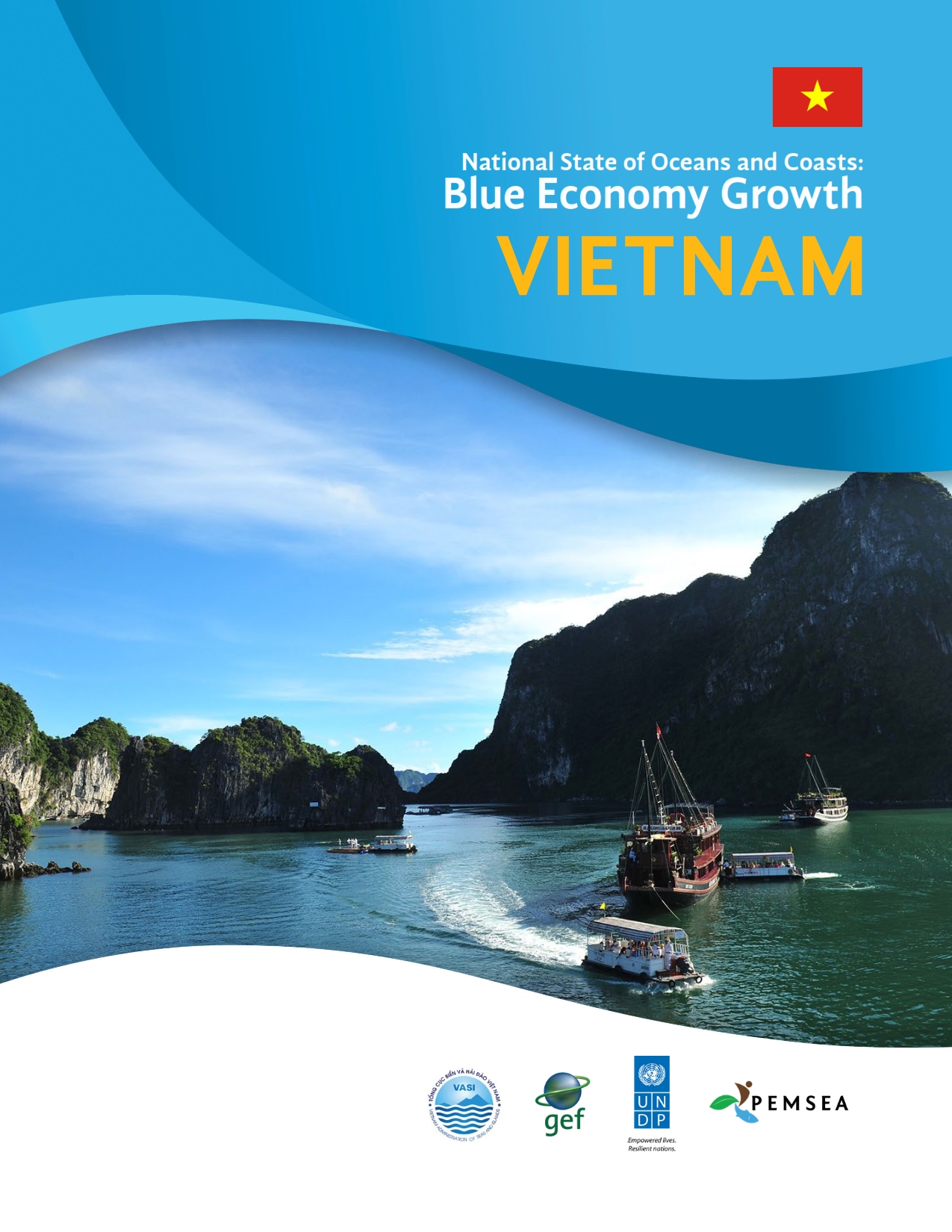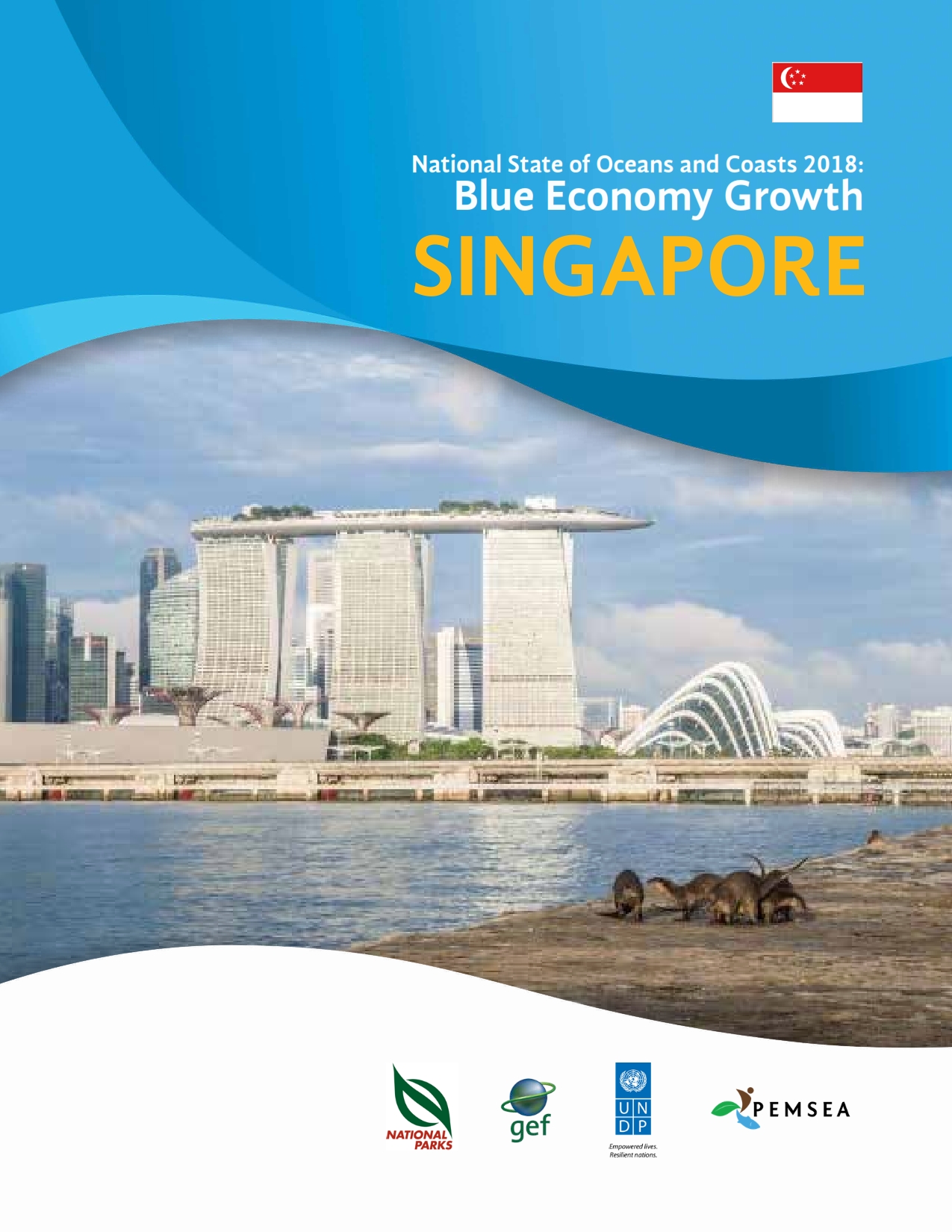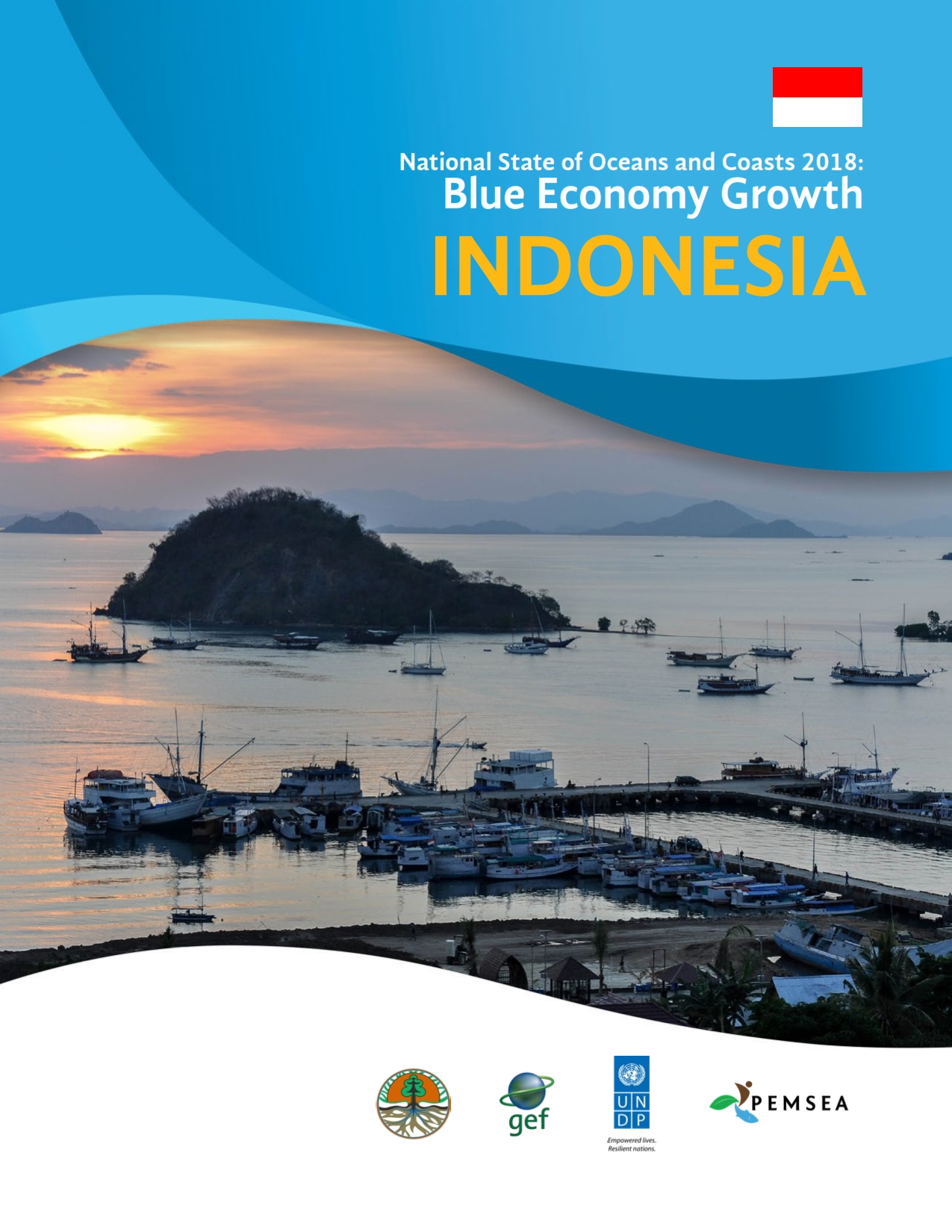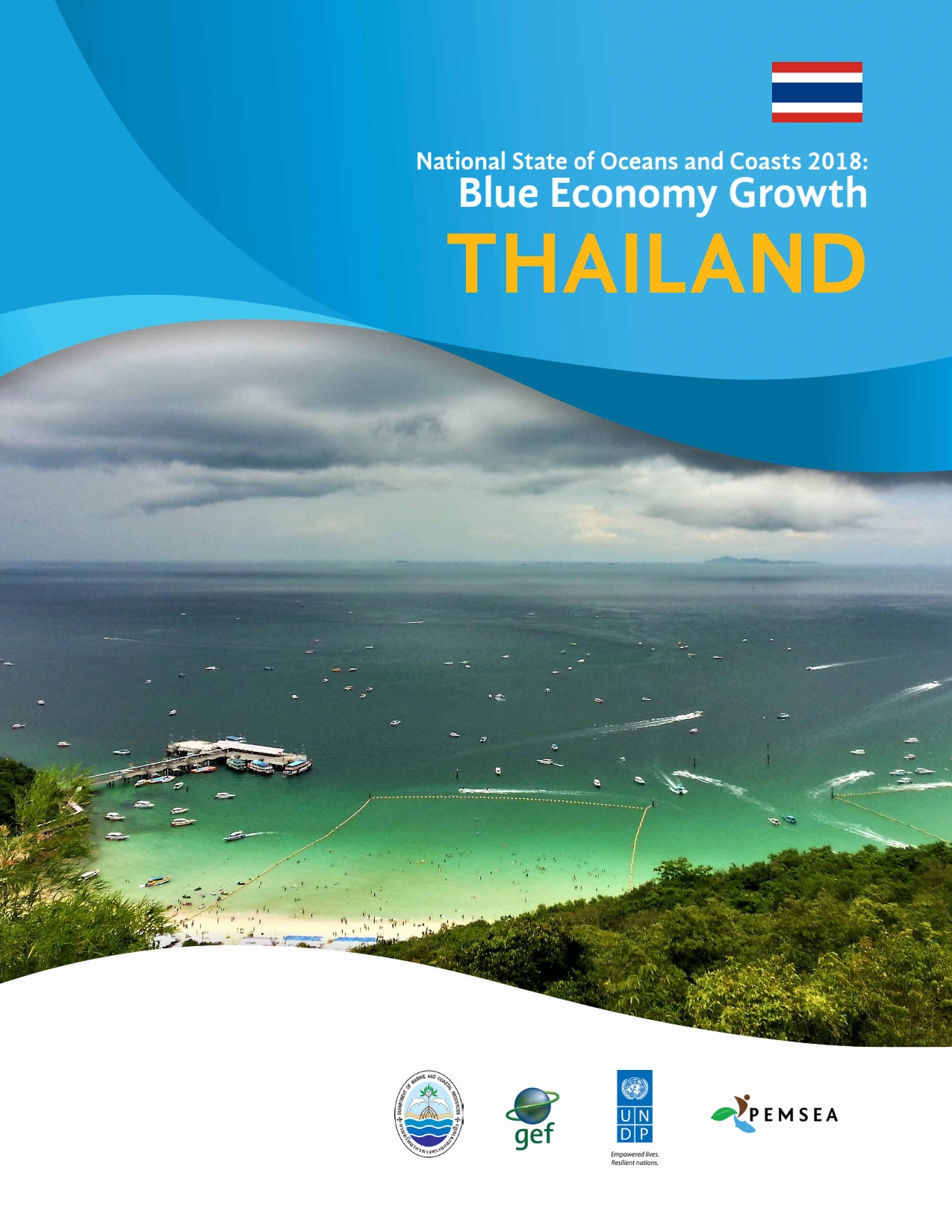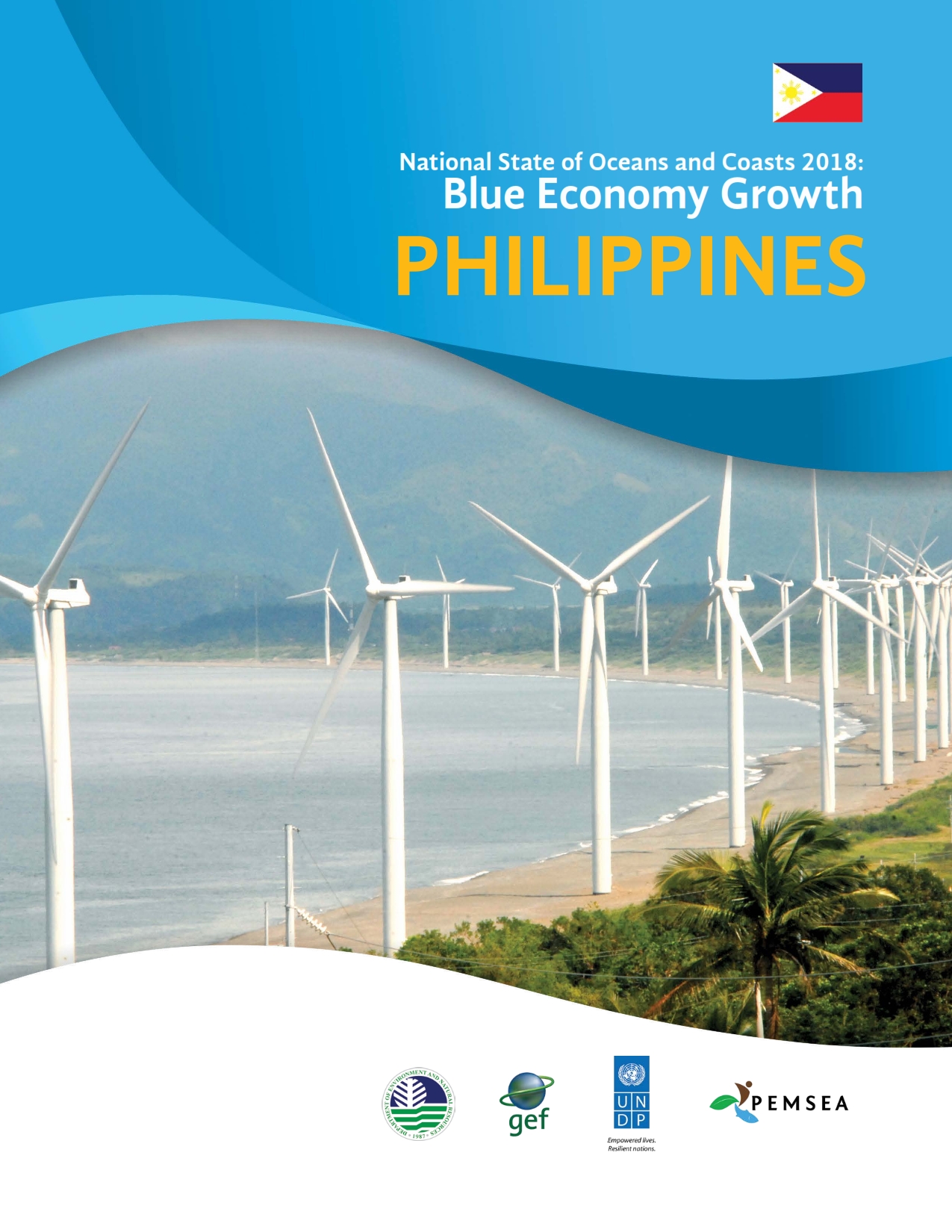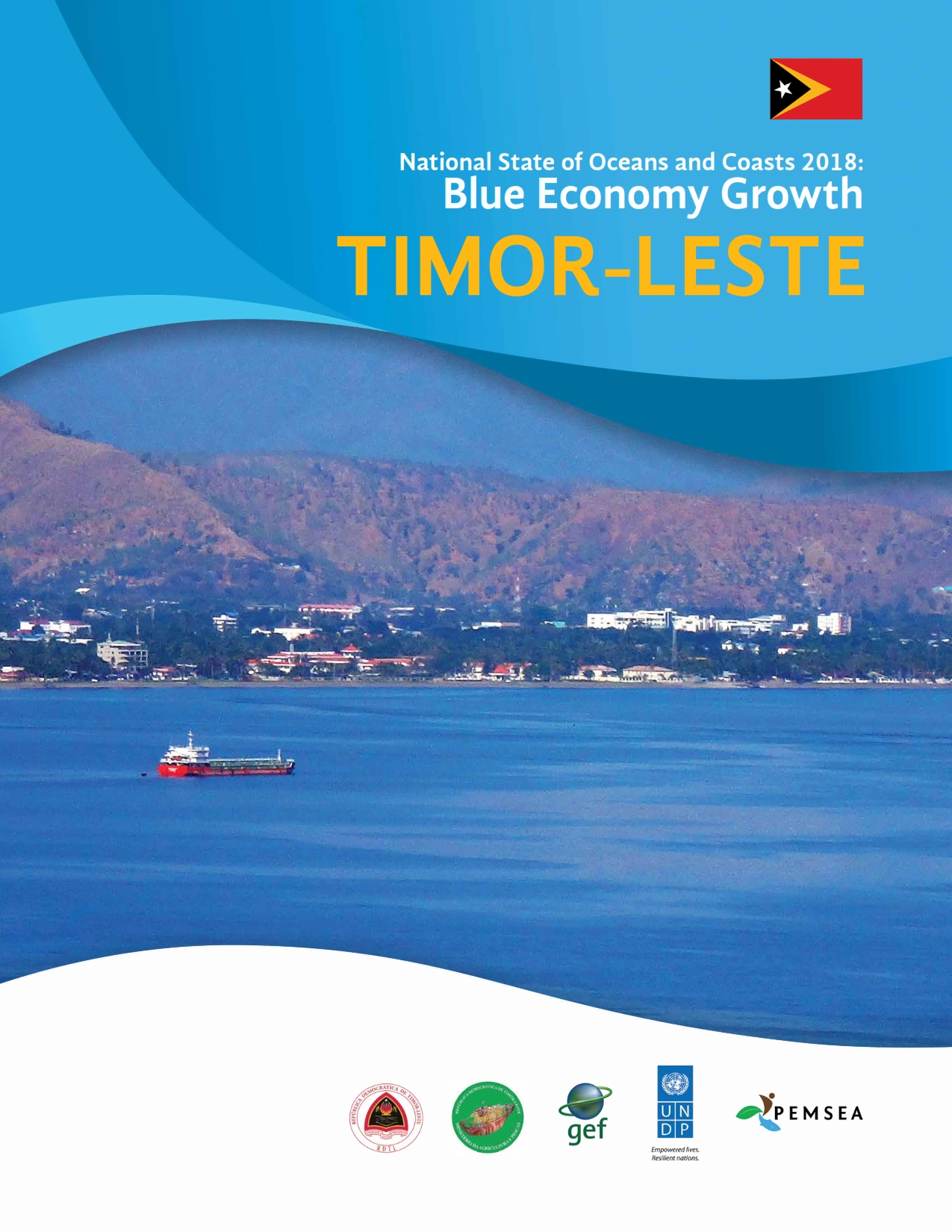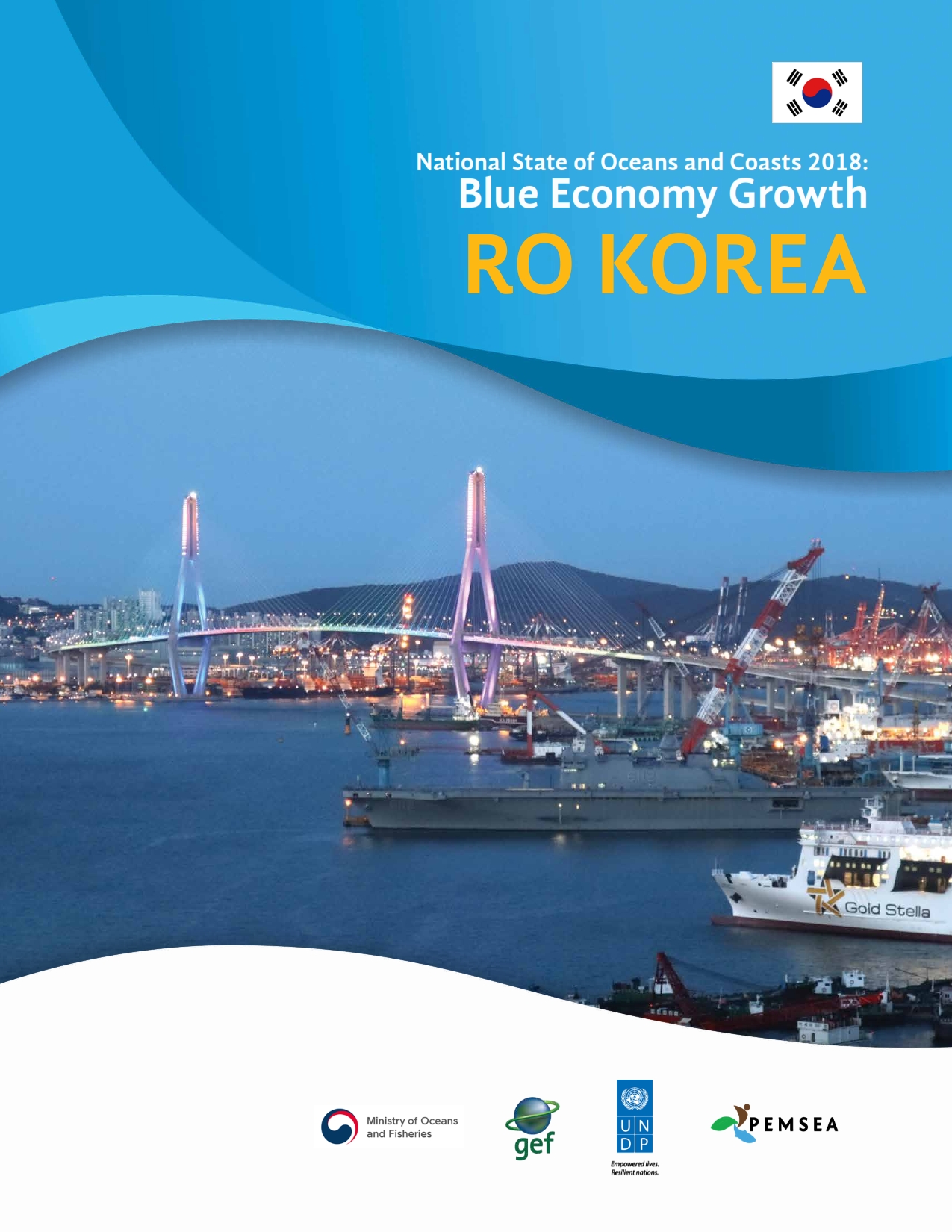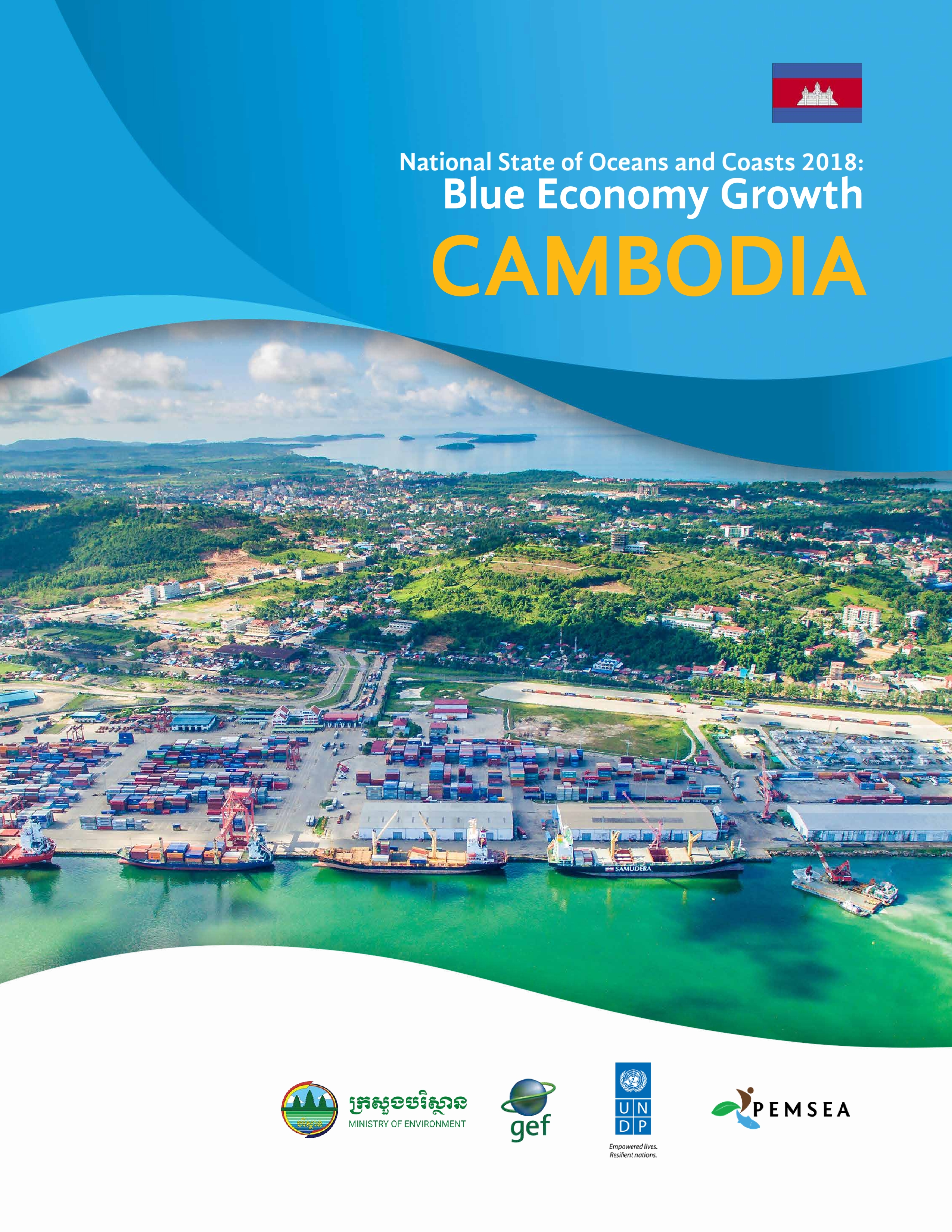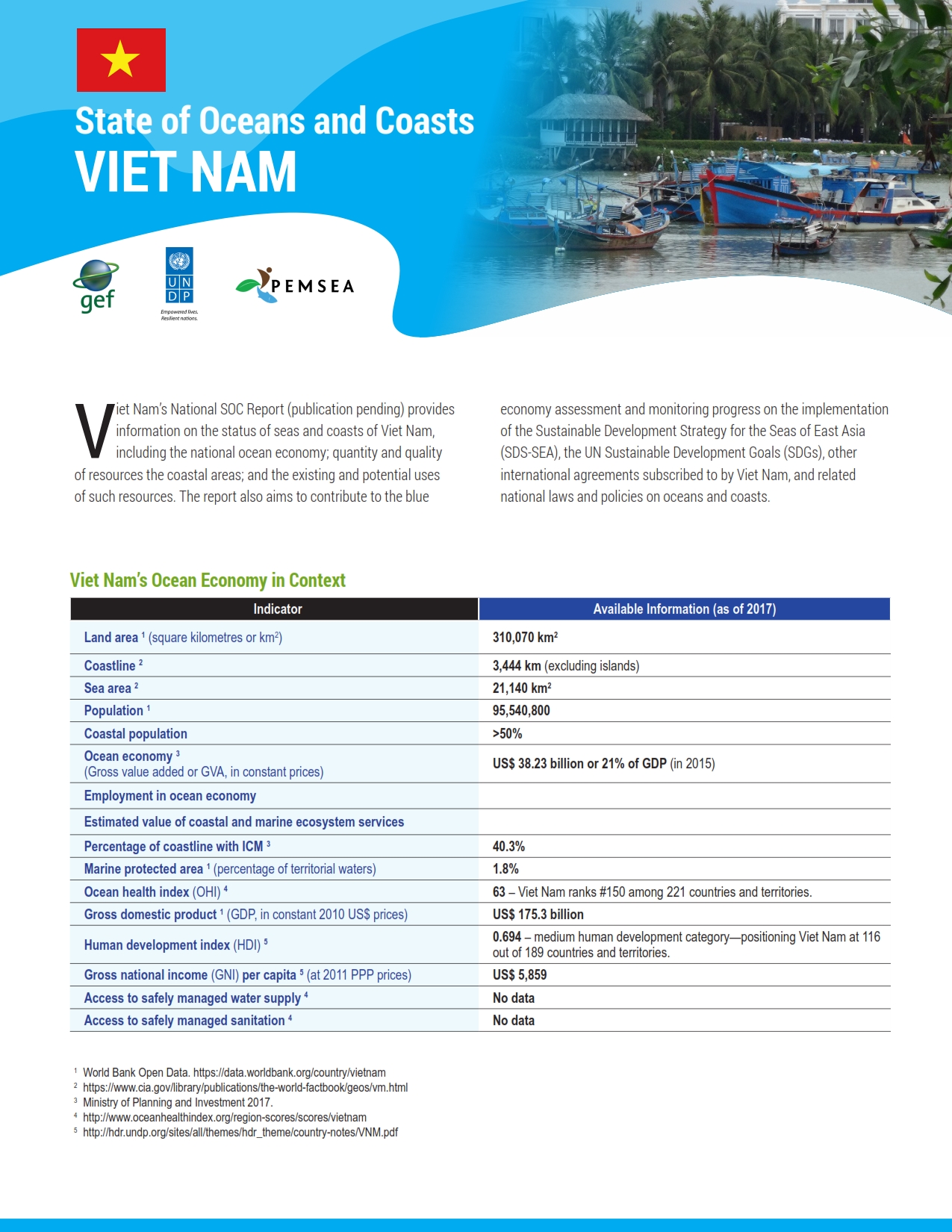-
NSOC Viet Nam
Therefore, Vietnam’s NSOC report, with focus on “Blue Economy Growth”, aims to provide initial information on the state of the marine and coastal areas of the country, including socioeconomic, environmental and institutional aspects. Preparing the first NSOC report is a stocktaking effort, involving data collection and analysis of ocean-based and ocean-related economic activities, benefits and value of marine and coastal resources, and the ocean governance and blue economy initiatives that address the pressures and impacts affecting the ocean economy and ocean health.
The NSOC report also adopts the Drivers-Pressures-State-Impacts-Response (DPSIR) framework as a way to organize the indicators and assess ocean health and the ocean economy. It is policyoriented, and it provides a framework for categorizing a problem domain, along the causeeffect chain. The highly-complex marine system has a large number of interrelated processes acting between its physical, chemical, and biological components.
-
NSOC Singapore
Singapore’s SOC Report aims to facilitate our understanding of the role of the ocean and its contribution to the national economy; impacts of human activities on ocean health and sustainability; potential areas for investments in environmentally-sound technologies and infrastructure; and the interventions and innovative mechanisms needed to respond to changing environment and climate. Knowing that sustainable use of the oceans is coupled with the UN Sustainable Development Goal (SDG) 14, Life Below Water, it is evident that preserving the health of our oceans is a fundamental prerequisite for business to operate in the long-term and by tackling the challenges of today.
The progressively intense and diversified use of Singapore’s coastal and marine environment (CME) necessitates an integrated approach for effective coastal management and its sustainable use. The SOC Reporting mechanism is also employed to assess the overall effectiveness of Integrated Coastal Management (ICM) implementation. In this report, we look back over a five- to ten-year period to examine the latest trends in the state of our coasts and analyze how and why the CME is changing and whether these trends fit within the context of sustainability and the blue economy development. The report provides a comprehensive outlook of different areas of sustainable development that contribute to blue economy growth in Singapore.
-
NSOC Indonesia
The National State of Oceans and Coasts (NSOC) report of Indonesia aims to:
- Compile data and information related to the country’s ocean uses and values, ocean health and pressures, ocean governance structure, and blue economy initiatives to serve as baseline information on blue economy development in Indonesia;
- Contribute to the regional and national blue economy assessment and monitoring of the implementation of the National Ocean Policy, Sustainable Development Strategy for the Seas of East Asia (SDS-SEA), SDGs, other related international agreements, and national laws and policies; and
- Aid policy-making, planning and management of the coastal and marine areas and resources of the country, and highlight the need to protect the marine environment and ecosystems to optimize the benefits of blue economy and ecosystem services.
-
NSOC Thailand
The NSOC report provides a comprehensive picture of the ocean economy and its contribution to national economy, incomes, jobs, and well-being as well as the transition towards blue economy – emphasizing the best practices, innovations, investment opportunities, and challenges. It contains information on the state of ocean health upon which the blue economy relies on, in particular, marine water quality; coastal and marine resources; the existing and potential uses of such resources; and the pressures. The report also presents the governance structure – policies, laws, plans, capacity development, and institutional arrangements – and on-going actions to mitigate habitat destruction, pollution, destructive and overfishing, climate change, and other pressures on the coastal and marine environment and ecosystems. Gaps and recommendations are pointed out to improve ocean governance and support a more innovative, inclusive, sustainable and climate resilient blue economy development.
The NSOC Report applied the drivers-pressures-state-impacts-response (DPSIR) framework for the analysis. It also involved review of literature, existing studies and reports, as well as consultations with key government agencies and other stakeholders. Their participation, ideas and perspectives had been crucial to the preparation of this report.
The NSOC report is therefore supportive of evidence-based policy-making and planning as it shows the benefits derived from the oceans as well as the tradeoffs, impacts of human activities, effects of the changing environment and climate, and outlook for blue economy.
-
NSOC Philippines
This National State of the Oceans and Coasts (NSOC) 2018: Blue Economy Growth Report of the Philippines aims to contribute to the over-all assessment and monitoring, not only of the SDS-SEA implementation, but also the SDGs and other related international agreements and national policies. As expressed in the Changwon Declaration 2012, PEMSEA and the EAS countries believe that blue economy offers a useful framework and organizing principle for the sustainable development of coastal and marine areas. With a growing global population, mounting pressures on the environment and existing resource base, and increasing access to coastal and marine areas through technological advances, the accelerated development and exploitation of coasts and oceans is a certainty. Hence, a developmental framework that will put a premium on balancing economic development with environmental protection, habitat and biodiversity conservation, and social welfare is of utmost importance.
-
NSOC Timor-Leste
- Compile data and information collected from different concerned agencies and organizations to serve as baseline information related to the country’s ocean economy, coastal and marine resources and environment, socioeconomic condition, governance structure, and blue economy initiatives;
- Contribute to the blue economy assessment, and monitoring of the implementation of the Sustainable Development Strategy for the Seas of East Asia (SDS-SEA), UN Sustainable Development Goals (SDGs), other international agreements, and related national laws and policies; and
- Aid policy-making, planning and management of the coastal and marine areas of the country, and monitoring of the country’s progress.
The NSOC Report uses available data from agencies, reports and studies. It is limited by lack of disaggregated data for the ocean economy, and current data on the marine environment and ecosystems, and initiatives related to blue economy development. Nevertheless, the information presented in this report provides an overview of the valuable and vulnerable oceans, and shows potential areas and opportunities for more sustainable growth path.
-
NSOC RO Korea
The National SOC Report provides information on the status of seas and coasts of RO Korea, including the ocean economy, the existing and potential uses of coastal and marine resources, and the corresponding benefits and impacts. Responding to the issues and pressures affecting both the ocean economy and ocean health, RO Korea adopted policies, laws, and institutional reforms as well as invested in research and development for innovative technologies, and more sustainable ocean industries.
-
NSOC Cambodia
Cambodia’s National SOC Report provides information on the status of seas and coasts of the country, including its ocean economy; coastal and marine resources; the existing and potential uses of such resources, and the corresponding benefits and impacts. The NSOC report of Cambodia aims to:
- support the Information Management System for the Coastal Zone and compile data and information collected from different concerned agencies to serve as baseline information for the assessment of coastal and marine areas of Cambodia;
- contribute to the blue economy assessment and monitoring of the implementation of the Sustainable Development Strategy for the Seas of East Asia (SDS-SEA), SDGs, other international agreements, and related national laws and policies;
- aid policy-making, planning and management of the coastal and marine areas of the country, including the natural resources, environment, economic activities and investments, and foster inter-agency collaboration; and
- monitor the Vulnerability Assessment and Adaptation Programme for Blue Economy Development in Cambodia’s marine and coastal areas.
-
State of Oceans and Coasts of Viet Nam
Viet Nam’s National SOC Report provides information on the status of seas and coasts of Viet Nam, including the national ocean economy; quantity and quality of resources the coastal areas; and the existing and potential uses of such resources. The report also aims to contribute to the blue economy assessment and monitoring progress on the implementation of the Sustainable Development Strategy for the Seas of East Asia (SDS-SEA), the UN Sustainable Development Goals (SDGs), other international agreements subscribed to by Viet Nam, and related national laws and policies on oceans and coasts.

